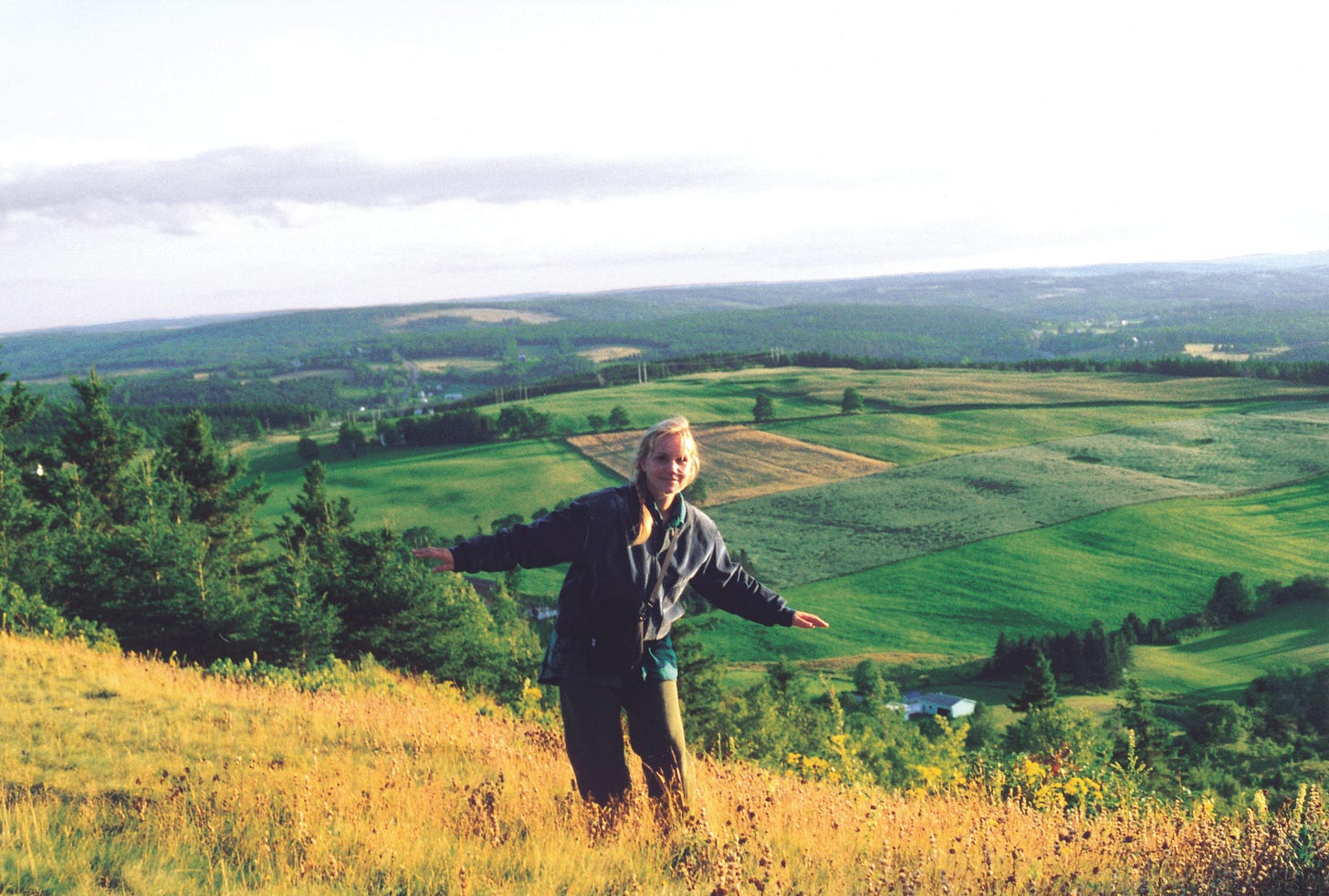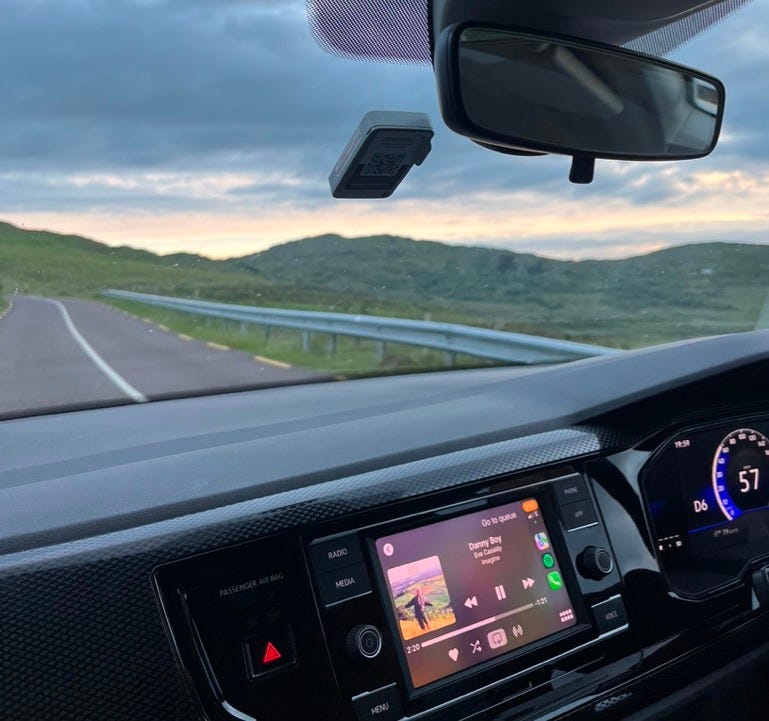When I was a young girl, I used to sit by the CD player in our kitchen and listen to the familiar voices of my parents’ CD collection. I found great satisfaction in the harmonies of Alison Krauss and Union Station. The warm, jolly rumble of Louis Armstrong lifted my spirits. Bob Dylan’s Nashville Skyline album played all summer long, perfectly setting the mood for breezy evening sunsets.
But there was one voice set apart from the rest, one that would inevitably leave me changed by its beauty. I would sit in wonder, listening to this angelic voice echo from the speakers. She would say, “This is one that I used to listen to when I was a little, little kid. My parents had this record and I’d listen to it over and over. And I’ve been wanting to do this song for a really long time. It’s called ‘Tall Trees in Georgia.’” Then, as if the veil between heaven and earth was momentarily lifted, the ethereal voice would tell a story, gliding through the melody in perfect softness and pitch. No longer was I just listening to a recording, but I felt that the voice had come to life and was in the room with me, speaking the lyrics as if she had lived them. These were the moments in which I first came to know the woman this voice belonged to, the voice I believe to be the greatest of our time: the voice of Eva Cassidy.
After a few decades of loving Eva Cassidy’s music and wondering about her story, who she was, and what she was like, I was finally able to speak to someone who actually knew her: the pianist in her band, Lenny Williams. Lenny not only graciously answered my questions and shared stories and memories of Eva, but he was able to describe Eva and the power of her music in a way that expressed precisely why she was so special.
After attending the Peabody Conservatory in Baltimore where he studied composition, Lenny moved to D.C. and started playing in clubs and restaurants. While there, he met Chris Biondo who owned a studio in Rockville, MD and was one of the first people to recognize Eva’s talent. “Everybody who heard her sing knew she was good,” Lenny recalled, “but Chris was the first one to be like, we have to do something. You have to record. We have to get you out there.” About a year later, they started to get a band together for a record Eva was going to do with Chuck Brown called The Other Side.
Lenny and I talked for a while about Eva’s voice. “You can count on one hand the number of times I’ve heard her sing out of tune or hit a bad note. It’s just amazing her accuracy and her ear…I think her hearing was more evolved than most humans,” he said. To give me an idea of how effortlessly Eva sang, Lenny shared a memory from a session they did for The Other Side. “They were singing ‘I’ll Go Crazy’ which is an old James Brown tune…She’s sitting next to me at the piano with the lyric sheet, hunched over with the microphone, just hitting these notes that were like what the hell, you know. Just wailing! And most people would have to physically really put their back into that. It just came out of her like it was nothing…She was amazing.”
Not only was Eva’s power and clarity undeniable, but her voice had no limits. Whether it was a celtic ballad, jazz, or gospel, she could sing anything and make it her own. She did songs like “American Tune”, “Easy Street Dream”, and “Oh, Had I a Golden Thread”, each one in her own unique style. Present in all her music, no matter the genre, was the way her tonality and lyricism brought the meaning of a song to life.
“Do you think she knew how good she was?” I asked. “No. Or if she did, she didn’t care.” In the few years the band played together, Eva just got better and better. “She got really good really fast,” Lenny said. “I mean, she was always great, but when we first recorded, you know, she was a great singer singing a song…And she went from having a great instrument to being a great artist.” Despite all this, record companies did not sign her.
“I remember the guys from Blue Note coming down a couple times and hearing her, and basically just kind of saying we don’t know, we’re a jazz label…Basically that’s what everybody from record companies told her: you need to pick a lane. You need to do the soul thing, do the R&B thing, do the jazz thing, do the rock thing, do the folk thing, but we can’t sell you if you’re just gonna do all those. She was too diverse. They didn’t know how to market her.” Nevertheless, Eva wasn’t going to change who she was or the music she sang to get a record deal. She was not motivated by fame or profit.
So, the band decided to record their own album. In January of 1996, Eva and her band recorded at a jazz club in Washington, D.C. called Blues Alley. They recorded for two nights and, despite some tech issues, they were able to put together a thirteen track album. Though Eva didn’t personally like how she sounded in most of the songs due to having a cold, the Live at Blues Alley album became one of the most beloved by her fans. However, Live at Blues Alley was the only album that Eva would see released.
After the album’s release in May of 1996, Eva went to the doctor to check on what she thought was a hip injury. Lenny recalled how quickly it all happened: “It was so fast, you know, it was so fast….We played at Blues Alley again for the album release party in July and she was using a cane, but she hadn’t been diagnosed yet. She just thought she had hurt her hip painting murals or something, she told me. But then she went and then they found the cancer all through her. And then she was gone by November.” Only a few months later on November 2, 1996, Eva passed away at home in Bowie, MD.
Two months before she passed, there was a tribute concert held for Eva at The Bayou. “Everybody knew,” Lenny recalled, “Everybody wanted to say goodbye.” That night Eva sat on stage and sang “What a Wonderful World”. She must have sung those lyrics with sincerity: “And I think to myself what a wonderful world”. During her life, Eva was a lover of beauty and a creator of it. She spent her time enjoying nature, drawing, painting, and making music. Lenny said that Eva’s personality was just like her music: “She was otherworldly. Just in the moment. She didn’t care about money. She didn’t care about fame…And she was just all about the beauty in the world.” In one moment, Eva was a young woman fully alive, doing the things she loved and in the next moment she was gone.
It is easy to wonder what would have happened if Eva hadn’t passed away at 33 years old. What would she have done next? Would she have won a Grammy? Eva’s renown was largely posthumous. There were numerous unreleased recordings that–in the years following her death–were compiled and released as albums. After the Songbird album was released in 1998, Terry Wogan from BBC One heard Eva’s version of “Over the Rainbow”, and started playing it on the radio. That record would then climb to number one in the UK.
When a person dies young, you are reminded again and again of all that you feel they should have seen, but missed. In this case, Eva never really saw how her music was received, though celebrity and recognition certainly weren’t what she was after. Her music came from a place of honesty which is probably why its impact has been so great. As Lenny described, those close to her have witnessed its effect.
“The thing that I think about when I think about Eva…it’s what beauty can bring into the world,” Lenny said. “The overwhelming thing, the thing that moved us the most is how many people…got a level of solace, a level of comfort from her music when they were in bad times, dark times, when they had health problems or a family member had died or spouse had died, how her music helped them through…the beauty of her music, the otherworldliness of it. Sometimes when you hear something that beautiful or a singer that intimate, they can take you to a place where you can’t think about anything else except what you’re hearing, and Eva had that ability. No matter how messed up, stressed out you were, you could put on ‘Fields of Gold’ and you couldn’t think about anything except what she was doing.” Her music leaves you better than it found you and, perhaps, this is the whole point of beauty.
Months ago when I was visiting Ireland, I drove along the winding roads of Killarney National Park. Rolling fields of green stretched far into the distance, lofty hills dotted with sheep rose and fell all around, and the golden evening sun cast a shimmering glow into the valleys. It was the most brilliant scene I have ever witnessed. There was just one thing that could make it truly heavenly. I searched through my songs, found Eva’s album Imagine, and played “Danny Boy”.
Eva’s voice is the best of our time not only because of how it sounds, but because of how she was able to communicate with it, stirring something within us and elevating us from time itself. She had something extraordinary that cannot be put into words. It was simply a gift.
Though the world lost Eva Cassidy, she lives on in the music she created and in the timeless beauty of her voice.
It is impossible for words to convey the quality of Eva’s voice. You must simply hear it for yourself. Listen to Eva’s music on Spotify or Youtube.





